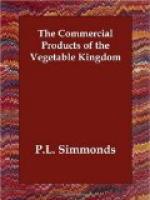It will be at once seen that there is a close general resemblance between these two substances, although there is no doubt that the castor cake is inferior to rape cake; still I believe that this inferiority is fully counterbalanced by the difference in price, which is such that, compared with rape cake, the castor cake is really a cheap manure. There is only one of its constituents which it contains in larger quantity, and that is the oil. No weight is, however, to be attached to the quantity of oil in a manure. In a substance to be used as food, it is of very high importance; but so far as we at present know, its value as manure is extremely problematical. Whale, seal, and other coarse oils have been used as manures, and by some few observers benefits have been derived from their application, but the general experience has not been favorable to their use, nor should we chemically be induced to expect any beneficial effect from them. We have every reason to believe that the oils which are found in plants are produced there as the results of certain processes which are proceeding within the plant, and there is no evidence to show that any part of it is ever absorbed in the state of oil by the roots when they are presented to them. On the other hand, the oils are extremely inert substances, and undergo chemical changes very slowly; so that there is no likelihood of their being converted into carbonic acid, or any other substance which may be useful to the plant; and as they contain no nitrogen, and consist only of carbon, hydrogen, and oxygen, they can yield only those elements of which the plant can easily obtain an unlimited supply. I can conceive cases in which the oil might possibly produce some mechanical effect on the soil, but none in which it could act as a manure, in the proper sense of the term.
KANARI on.—Mr. Crawfurd, in his “History of the Indian Archipelago,” speaks most favorably of an oil obtained from the “Kanari,” a tree which, he says, is a native of the same country as the sago palm, and is not found to the westward, though it has been introduced to Celebes and Java. I have not been able to distinguish its botanical name; but Mr. Crawfurd describes it as a large handsome tree, and one of the most useful productions of the Archipelago. It bears a nut of an oblong shape, nearly the size of a walnut, the kernel of which is as delicate as that of a filbert, and abounds with oil. The nuts are either smoked and dried for use, or the oil is expressed from them in their recent state. It is used for all culinary purposes, and is purer and more palatable than that of the coco-nut. The kernels, mixed up with a little sago meal, are made into cakes and eaten as bread.




